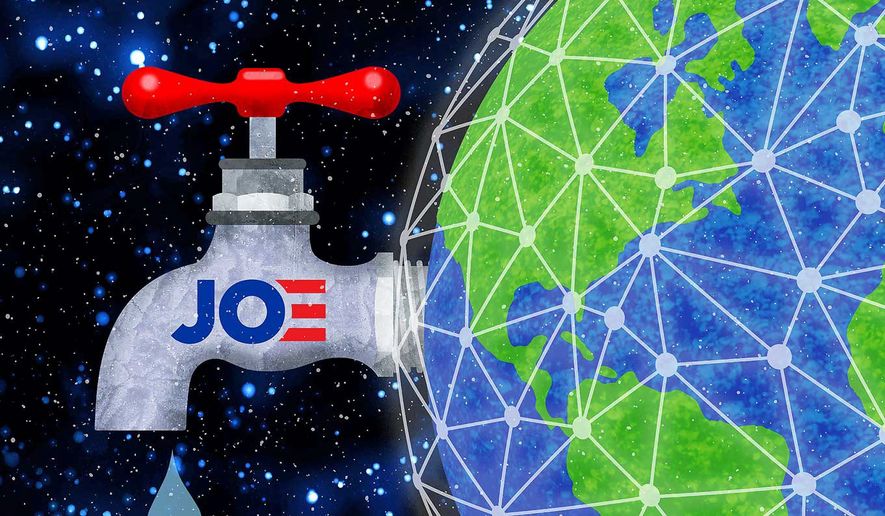OPINION:
As the COVID-19 pandemic begins to fade, American consumers face high prices and shortages of many basic goods and services — like food, gas, and lumber — due to disruptions in supply chains and inflationary policies. Yet, one industry has triumphed during the trials and tribulations of the past year with no major price jumps or disruptions: Broadband.
During the height of the pandemic, the United States was the only country to avoid any internet speed degradation according to an analysis by BroadbandNow. That’s no doubt thanks in part to the light-touch regulatory environment fostered by then-FCC Chairman Ajit Pai. Yet, with a new administration in power, the FCC seems poised to reverse the market-driven triumph of recent years’ broadband by reinstituting net neutrality protections. For the sake of our connected future, they should think twice.
This month, President Joe Biden issued an executive order addressing competition across many industries of the American economy, including broadband. In the order, the president encourages the FCC to adopt net neutrality rules similar to those made under the Obama administration in 2015. As stated plainly, net neutrality is the principle that internet service providers (ISPs) should treat all traffic equally.
While that may sound like a good thing, it’s entirely unnecessary and has the potential to hamper internet growth to the detriment of all. The internet flourished for nearly three decades without any major cases of ISP discrimination, such as throttling speeds to access competitors’ products. In fact, as Clemson University Professor Thomas Hazlitt points out in Reason, two of the most famous examples of ISPs being investigated by the FCC for giving preferential treatment to certain content was wireless companies MetroPCS and T-Mobile giving their customers free data to stream videos — a business trend that should be encouraged if anything!
Nevertheless, the Obama FCC issued net neutrality in a 2015 order, reclassifying ISPs as common carriers to apply many of the same rules to the internet that telephone service providers abide by. Just two years later, the Pai FCC reversed the order, returning to the light-touch approach that allowed the internet to flourish for over a quarter-century.
At the time, political actors on the left were frantic. The Senate Democrats’ Twitter account famously posted an obnoxiously formatted tweet with one word per line and double spacing stating: “If we don’t save net neutrality, you’ll get the internet one word at a time.” CNN claimed that the decision marked the “end of the internet as we know it.” The Washington Post predicted that ISPs would become censors, “blocking certain websites that they don’t like or compete with their own business.” Even Burger King got in on the action, creating a commercial strangely analogizing service at their restaurants to the internet with the underlying message customers would have to pay extra to receive their Whopper (i.e. internet) at a normal speed without neutrality.
Of course, none of this came to fruition. On the contrary, industry investment quickly increased as well as internet speeds. The record could not be clearer. Outside the U.S., net neutrality regulations have proven costly as well, as seen in a recent study comparing internet speeds and regulations around the world:
Researchers from the Vienna University of Economics and Business examined net neutrality policies in 32 of the 37 countries in the Organisation for Economic Co-operation and Development (OCED), finding a negative correlation between regulations and internet expansion. The study found that only two countries (Australia and New Zealand) had not implemented net neutrality regulations and both experienced better outcomes in internet development than the other 30.
Despite the ample evidence, Biden’s FCC may soon follow the same failed path of the Obama administration, implementing unneeded, top-down regulations on an industry that, given the long arc of history, is still in its early stages. Overregulating the internet in its early stages could be like nipping a flower in the bud before full bloom. One can only imagine the innovations lost to bad rulemaking if politicians apply an antiquated regulatory structure like common carrier restrictions to cutting-edge technology.
For now, the internet’s saving grace may be that President Biden has yet to appoint a fifth FCC commissioner, breaking the tie needed to implement net neutrality. When that vacant seat is finally filled, the administration would be wise to avoid wading into such a divisive subject as net neutrality. Instead, it can focus on other important bipartisan priorities such as closing the digital divide and freeing up more wireless spectrum.
In the post-COVID age, it’s important for Americans to have access to high-speed internet to work, learn, shop, and connect with loved ones far away. Why would the new administration dare meddle with the winning formula of light-touch rulemaking right out of the gate?
• Casey Given is the president and executive director of Young Voices.




Please read our comment policy before commenting.